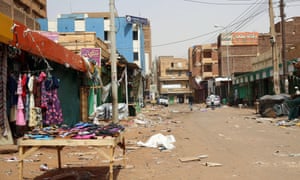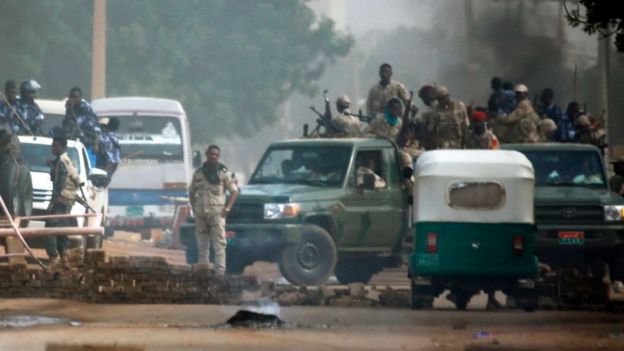DOS_patos
Unverified Legion of Trill member
Sudanese doctors say dozens of people raped during sit-in attack
Doctors believe paramilitaries carried out more than 70 rapes during an attack on a protest camp in Khartoum, the capital of Sudan, a week ago.
More than 100 people were killed and as many as 700 injured in the attack last Monday on a sit-in and clashes afterwards, as paramilitaries from the Rapid Support Forces spread through the city to quell sporadic unrest.
Harrowing details of rapes by the RSF have emerged in recent days despite restrictions on communications in Sudan, but the extent of the sexual violence has remained unknown.
One doctor with access to data compiled by the central committee of doctors, a pro-reform group, said hospitals in Khartoum had recorded more than 70 cases of rape in the attack and its immediate aftermath.
A doctor at the Royal Care hospital said it had treated eight victims of rape – five women and three men. At a second hospital in the south of Khartoum, a medical source said it had received two rape cases, including one who was attacked by four RSF paramilitaries. Several witnesses have also described similar cases on social media.
Many victims have not sought medical treatment, either because of fear of reprisals, insecurity in the city, or because care has been limited. Human rights activists and experts have described the reports of sexual violence as reliable.
The crisis in Sudan continued on Monday with the second day of a general strike aimed at relaunching an opposition movement battered by a brutal crackdown, and forcing the country’s military leaders to resign.
Shops were closed and streets were empty throughout Khartoum and in the neighbouring city of Omdurman, though there was visibly more traffic in the streets than on Sunday, when the strike began. Four protesters were killed in sporadic violence in the two cities over the weekend.
A top US diplomat will head to the country this week to urge an end to the crackdown. Tibor Nagy, the US assistant secretary of state for African affairs, plans to meet both members of the military leadership and protest leaders in Khartoum.

FacebookTwitterPinterest
People walk down a mostly empty street in Omdurman, the neighbouring city to Khartoum. Photograph: Marwan Ali/EPA
Sudan’s military leaders have refused to make any concessions since the start of the strike, blaming the country’s protest movement for what they describe as a major threat to the nation and its security.
Lt Gen Jamaleddine Omar, from the ruling transitional military council, said late on Sunday that by closing roads and setting up barricades, the protesters had committed a crime.
“The technique of closing the roads and building barricades … is a fully-fledged crime as it deprives people from being able to go about their normal life,” he said.
Omar said the Forces for Declaration of Freedom and Change, a coalition of pro-democracy groups, was to blame for “all the regrettable events” of the past days.
The protest leaders, by their actions, have “crossed the line of peaceful practices … and have become a major liability for the country and the people’s security,” he said.
Omar also said the military and the RSF had reinforced their presence across the country “to restore life back to normal”.
The military took power after ousting the then president, Omar al-Bashir, in April after months of mass rallies. The ruling council has since refused demonstrators’ demands for an immediate move to civilian rule, instead pushing for a transitional power-sharing arrangement.
Talks between the opposition and the council ground to a halt last month then collapsed altogether after the raid on the protest camp.
The Sudanese Professionals Association, an umbrella group of unions that has been spearheading protests since December, urged the Sudanese to continue the general strike, part of a civil disobedience campaign to press the military.
The SPA posted videos and photos on social media it said showed deserted streets and closed shops and businesses in Khartoum’s Gabra neighbourhood and the eastern city of Wad Madani.
According to the protest leaders, participation in the strike on the first day exceeded their hopes. They vowed on Monday to continue their “peaceful resistance” until the military council was toppled.
The SPA urged people to close roads again, rebuild dismantled barricades across the country and avoid clashes with the RSF. Security forces on Sunday removed barricades from main roads and ended the sit-in area outside the military’s headquarters.
“The solution is to get life paralysed,” the protest leaders said.
Activists say professionals including bankers, doctors, air-traffic control staff, pilots, electrical engineers and economists have been targeted by intelligence services in what they say is an obvious attempt to break the strike.
The internet remains cut off in Khartoum, with other communications significantly restricted.
Doctors believe paramilitaries carried out more than 70 rapes during an attack on a protest camp in Khartoum, the capital of Sudan, a week ago.
More than 100 people were killed and as many as 700 injured in the attack last Monday on a sit-in and clashes afterwards, as paramilitaries from the Rapid Support Forces spread through the city to quell sporadic unrest.
Harrowing details of rapes by the RSF have emerged in recent days despite restrictions on communications in Sudan, but the extent of the sexual violence has remained unknown.
One doctor with access to data compiled by the central committee of doctors, a pro-reform group, said hospitals in Khartoum had recorded more than 70 cases of rape in the attack and its immediate aftermath.
A doctor at the Royal Care hospital said it had treated eight victims of rape – five women and three men. At a second hospital in the south of Khartoum, a medical source said it had received two rape cases, including one who was attacked by four RSF paramilitaries. Several witnesses have also described similar cases on social media.
Many victims have not sought medical treatment, either because of fear of reprisals, insecurity in the city, or because care has been limited. Human rights activists and experts have described the reports of sexual violence as reliable.
The crisis in Sudan continued on Monday with the second day of a general strike aimed at relaunching an opposition movement battered by a brutal crackdown, and forcing the country’s military leaders to resign.
Shops were closed and streets were empty throughout Khartoum and in the neighbouring city of Omdurman, though there was visibly more traffic in the streets than on Sunday, when the strike began. Four protesters were killed in sporadic violence in the two cities over the weekend.
A top US diplomat will head to the country this week to urge an end to the crackdown. Tibor Nagy, the US assistant secretary of state for African affairs, plans to meet both members of the military leadership and protest leaders in Khartoum.

FacebookTwitterPinterest
People walk down a mostly empty street in Omdurman, the neighbouring city to Khartoum. Photograph: Marwan Ali/EPA
Sudan’s military leaders have refused to make any concessions since the start of the strike, blaming the country’s protest movement for what they describe as a major threat to the nation and its security.
Lt Gen Jamaleddine Omar, from the ruling transitional military council, said late on Sunday that by closing roads and setting up barricades, the protesters had committed a crime.
“The technique of closing the roads and building barricades … is a fully-fledged crime as it deprives people from being able to go about their normal life,” he said.
Omar said the Forces for Declaration of Freedom and Change, a coalition of pro-democracy groups, was to blame for “all the regrettable events” of the past days.
The protest leaders, by their actions, have “crossed the line of peaceful practices … and have become a major liability for the country and the people’s security,” he said.
Omar also said the military and the RSF had reinforced their presence across the country “to restore life back to normal”.
The military took power after ousting the then president, Omar al-Bashir, in April after months of mass rallies. The ruling council has since refused demonstrators’ demands for an immediate move to civilian rule, instead pushing for a transitional power-sharing arrangement.
Talks between the opposition and the council ground to a halt last month then collapsed altogether after the raid on the protest camp.
The Sudanese Professionals Association, an umbrella group of unions that has been spearheading protests since December, urged the Sudanese to continue the general strike, part of a civil disobedience campaign to press the military.
The SPA posted videos and photos on social media it said showed deserted streets and closed shops and businesses in Khartoum’s Gabra neighbourhood and the eastern city of Wad Madani.
According to the protest leaders, participation in the strike on the first day exceeded their hopes. They vowed on Monday to continue their “peaceful resistance” until the military council was toppled.
The SPA urged people to close roads again, rebuild dismantled barricades across the country and avoid clashes with the RSF. Security forces on Sunday removed barricades from main roads and ended the sit-in area outside the military’s headquarters.
“The solution is to get life paralysed,” the protest leaders said.
Activists say professionals including bankers, doctors, air-traffic control staff, pilots, electrical engineers and economists have been targeted by intelligence services in what they say is an obvious attempt to break the strike.
The internet remains cut off in Khartoum, with other communications significantly restricted.


